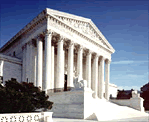| SUPREME COURT: BUSH ARGUMENTS | |
December 1, 2000 |
|

|
The nine justices of the U.S. Supreme Court heard arguments in a legal challenge of Florida's election recounts by George W. Bush's campaign. Bush lawyer Theodore Olson spoke for a few additional minutes after he and the others lawyers finished their arguments. |
|
JUSTICE
REHNQUIST: Mr. Olson, you have four minutes remaining. MR. OLSON: Thank you, Mr. Chief Justice. May it please the court. It seems to me that it is very difficult to read the Florida Supreme Court decision as saying anything else other than the Florida constitution, in their view, in that court's view, as trumping everything else. The second paragraph of the conclusion says, "Because the right to vote is the preeminent right in the Declaration of Rights of the Florida Constitution" and so forth. This opinion is full of language -- JUSTICE BREYER: Wouldn't they might -- they'd refer to the Declaration
of the Rights of Man, to the 1789, the French Revolution. I mean, the
right to vote is a value in the Constitution. Are they |
||||||||||||||||||||||||||||
| A fair, reasonable reading | |||||||||||||||||||||||||||||
|
MR. OLSON: Well, I think that the only reasonable, fair reading of
the decision is that the Florida Supreme Court felt that -- and it says
it over and over again -- that we are going to be -- attempt to discern
the will of the people, the will of the electorate, and discern and
enhance in whatever way we possibly can the right to vote. And there's a footnote there that does refer to reference to 3 U.S.C.
1 through 10, which of course includes Section 5. And it says so in
conjunction with the statement that the exercise of the discretion by
the secretary of state could not be done in such a way that would preclude
Florida voters from participating fully in the federal electoral process.
The court was assuming, it seems to me, that it did not -- was not --
the decision it was rendering was not going to cause a conflict with
the federal statutory scheme, and it was, we submit, in error in that
regard. |
|||||||||||||||||||||||||||||
|
|
|||||||||||||||||||||||||||||
|
|
|||||||||||||||||||||||||||||
|
|
|||||||||||||||||||||||||||||